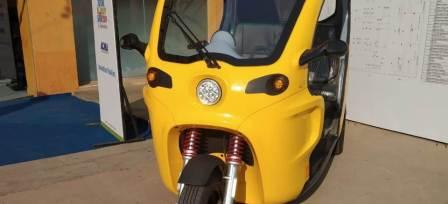Indians may prefer electric vehicles by 2022: Castrol Report

By Team Indoen
Posted on 04 Sep 2020
Tags: EV RE Reporter's Desk
A report by Castrol about the ‘Future of the Electric Vehicle Industry’ reveals that electric vehicles will revolutionize mobility across the globe and play an important role in the decarbonization of the economy.
Though electric vehicle sales have been rising steadily,
mainstream adoption is still a long way off with just one in 50 new cars being
sold as an electric vehicle.
The report expects that Indians will increasingly buy the electric vehicle by
2022 and by 2025 the majority of new car purchases could be electric.
The report explored views of consumers,
fleet managers, and industry specialists from eight of the world’s most important
electric vehicle markets. Electric vehicle markets in China, France, Germany,
India, Japan, Norway, the United Kingdom, and the United States were analyzed.
The report stated that a $36,000 price the point, a 31 minute charge time and a 469-kilometer range would rapidly
accelerate the global electric vehicle market. On the other hand, a price point
of ₹23, 00,000 ($31,000), 35 minute average charge time, and a range of 401 kilometers
could propel a switch towards the adoption of electric vehicles in India.
Sandeep Sangwan, Managing Director, Castrol
India Limited said Castrol’s global research revealed that consumers were ready
to switch to electric vehicles and buyers in India were keen to do so earlier
than in other markets. He said that though Indian consumers were price-sensitive
and seeking lower rates, they were willing to adjust to longer charge time and
slightly shorter range. He added that these market-specific nuances were
important, and accelerating the evolution would provide a clear roadmap in the
transition to electric vehicle adoption in India as well as in the world.
Mandhir Singh, Chief Executive Officer,
Castrol spoke about the flexibility of the automotive industry which during the
Covid-19 crisis turned its manpower to manufacture medical equipment. He said
that with electric vehicle technology constantly improving, the new challenge would
be to drive a low carbon recovery and accelerate the evolution towards electric
vehicles as quickly as possible.
Castrol has been working with the
automotive industry to develop unique e-fluid technology to support electric
vehicles, from battery coolant e-fluid, e-greases, and transmission fluids.
Bringing down the cost and charging time, increasing the range, building infrastructure
will be critical to enticing customers to buy electric vehicles.
The study reveals that although global
attitudes to electric vehicle adoption remain positive some markets such as
those in India and China were more positive in buying electric vehicles. Manufacturers
who can meet critical challenges relating to price, charge time, range, and
infrastructure and vehicle choice are well placed to win the market share, the
report said.
Interestingly, the National Electric
Mobility Mission Plan had set an ambitious target of 6-7 million sales of
hybrid and electric vehicles by 2020. This, however, didn’t happen with battery
prices continuing to remain high. Analysts also pointed towards constraints in
parking space and the safety of lithium batteries which would quickly reach
ignition temperatures in hot conditions as challenges to be dealt with before moving
towards mass adoption. Although union minister Nitin Gadkari once famously
stated that he wanted oil-fuelled car sales in the country to come down
drastically to curb the menace of air pollution, the journey is still a long
one.
- India to tighten scrutiny on EV investments: Report
- New e-car norms on way as India ... a China Wall on EV street
- The Electric Vehicle Challenge: Can We Make it Sustainable in India?
- Govt to come out with detailed guidelines for EV policy
- We need to build a circular economy ... energy value chain
- Green power on super-fast track
- Tendering in India’s renewable energy sector crosses 69 GW, says IEEFA
- Coal India and NMDC on global hunt for lithium mines
- At 4.59 Mt, India's 05 - 11 May steam coal imports rise 35% week-on-week
- RE Ministry Streamlines Approval Process for Solar Parks